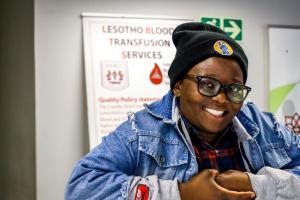Together, Lesotho’s blood donors save lives
Maseru ‒ One afternoon in May 2025, 48-year-old Lebohang Pitso* from Lesotho’s capital, Maseru, felt her life slipping away. Weakened from a bout of severe bleeding caused by cervical cancer, she sought emergency care at the city’s renowned Senkatana Oncology Clinic. A few hours after being admitted and receiving a blood transfusion, she felt a powerful transformation take place in her body.
“It was like a heavy cover was removed from my face,” she says. “The blood gave me life.”
Moved by the experience, Pitso asked her family to give back. “Four of my family members went to the blood bank and donated blood,” she says. “Blood donors are doing a great job. If it were not for my condition, I would be a regular donor. I encourage those who can, to give life to others.”
Lesotho Blood Transfusion Services is ramping up efforts to recruit and retain blood donors. It has implemented several strategic approaches, such as promoting blood donor clubs in schools and conducting mobile outreach blood donation drives, which have led to improved blood collection. In 2024, the institution carried out 165 mobile blood donation drives. Overall, there has been an almost 70% increase in the number of units collected between 2017 and 2024, from 5583 to 9411.
“But demand is higher than supply,” says Manaledi Makhetha, a phlebotomist at Lesotho Blood Transfusion Services. “For example, the 180 units we collected during a week-long campaign this year were all used in just two days,” she says. The total number of units collected per year, although improved, still falls short of the annual target of 10 000 units.
Makhetha screens donors, collects blood and ensures its safe delivery to various hospitals. “The primary need for blood transfusions is maternal- and cancer-related cases and road traffic crash survivors, among others,” she says.
On average, Senkatana Oncology Clinic uses 2‒3 pints of blood a day. Many cancer patients require frequent transfusions, as both the illness and treatment compromise blood production. Rethabile Makhetha, an oncology nurse at the clinic, recalls one morning when four patients needed blood, but the clinic only had sufficient units for three. “Cancer is a long journey,” she says. “The patients become family. When we can’t help them due to blood shortages, it’s devastating.”
The Ministry of Health is increasing public awareness, advocating for regular donations and expanded infrastructure to meet increasing demand. “With World Health Organization (WHO) and other partners supporting the Ministry of Health with guidelines, policies and campaign events, Lesotho is making strides,” says Stephen Monkoe, Director of Laboratory Services at the Ministry of Health. “We are grateful to partners and donors alike. Blood donors are our heroes.”
Every year on 14 June countries mark World Blood Donor Day, as a tribute to unpaid blood donors who save lives, strengthen communities and show solidarity with others. The day is also an opportunity to highlight the ongoing need for safe, regular blood donations.
“It is imperative that everyone, from citizens to community leaders, private and public partners, and government, redouble our efforts to strengthen the national blood service,” says Thato Mxakaza, Health Promotion Officer in WHO’s country office in Lesotho. “By investing in vigorous collection, safe processing, and equitable distribution, we ensure that the profound gift of blood translates into sustained life and renewed hope for every recipient.”
In Maseru, 32-year-old Nthomeng Leuta encourages others to become regular blood donors. Curious to know her blood type, she began donating blood at high school. She discovered she was type O negative, the only blood type that can be transfused to any recipient and is therefore critical during emergencies when a recipient’s blood type is unknown. Motivated by her special status as a “universal blood donor” she jokingly refers to the blood bank her “second home.”
Leuta’s most precious memory is when she responded to a social media post from a man whose wife urgently needed a blood transfusion for an emergency caesarean section. Leuta responded, and the result of her donation was a healthy mother and baby boy. “The husband called me to inform me how I had saved two lives that are so dear to him,” she says. “I felt humbled and so happy.”
*Name changed
Communications Officer
Phone : (266) 590 17166
Email: nangwalel [at] who.int (nangwalel[at]who[dot]int)
Communications and marketing officer
Tel: + 242 06 520 65 65 (WhatsApp)
Email: boakyeagyemangc [at] who.int (boakyeagyemangc[at]who[dot]int)



